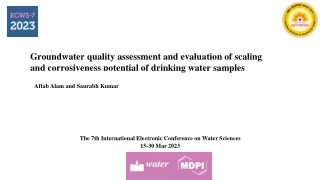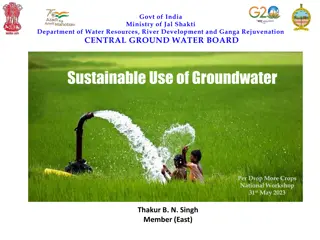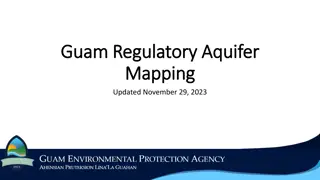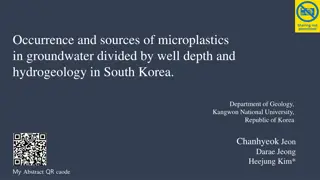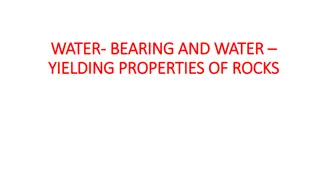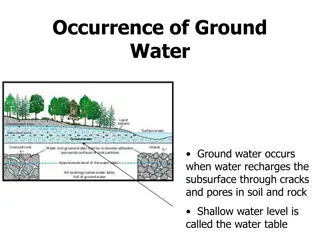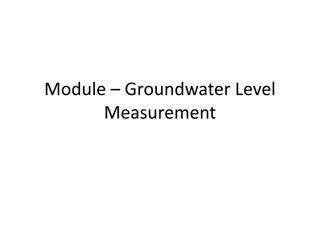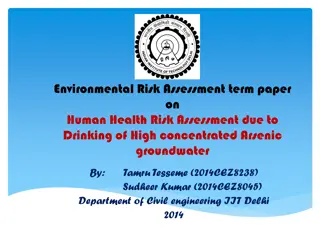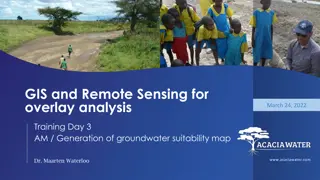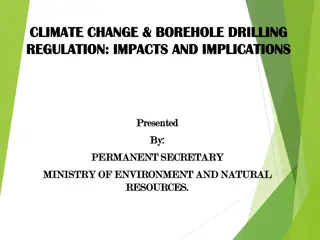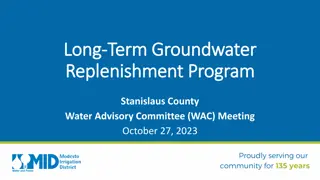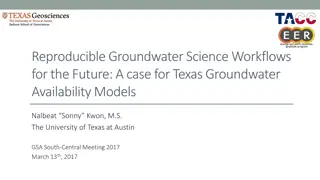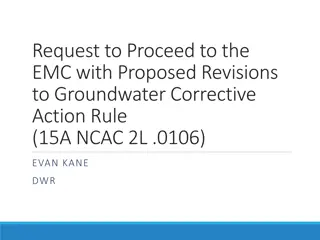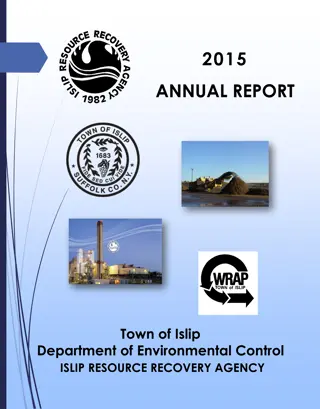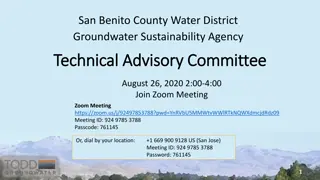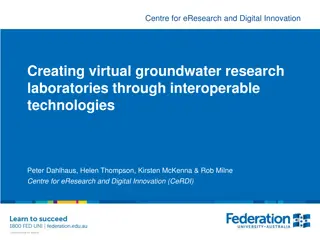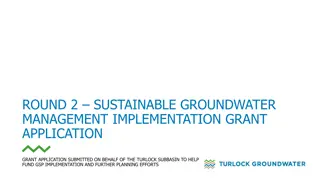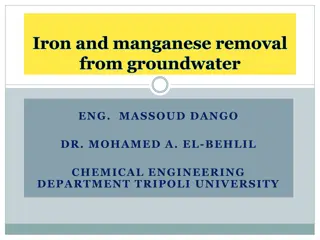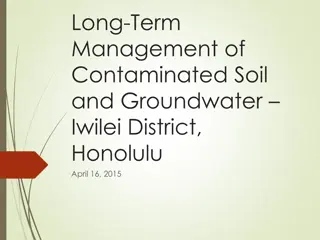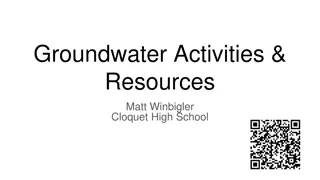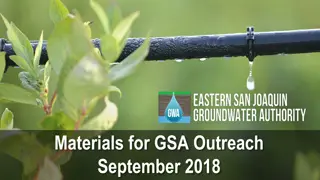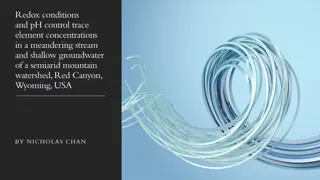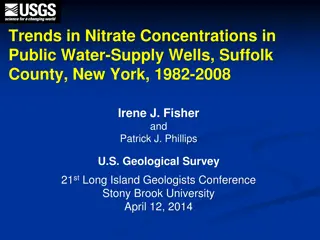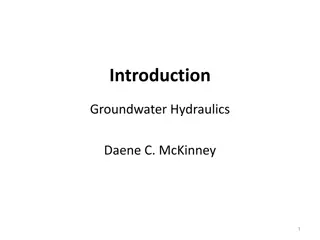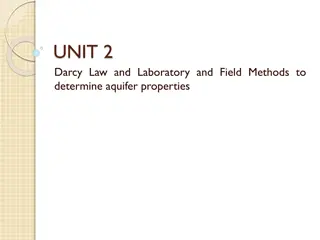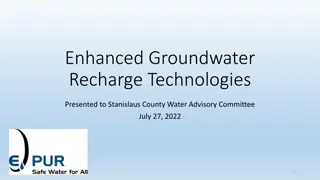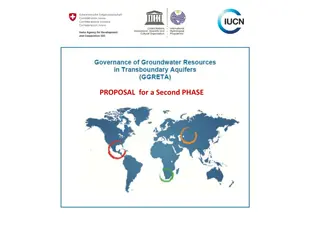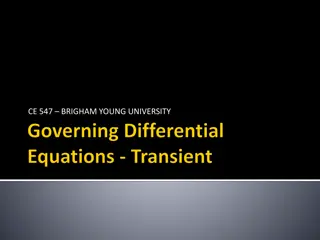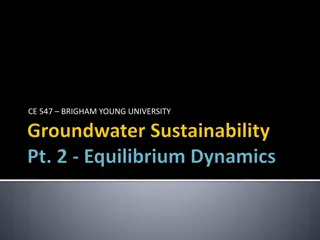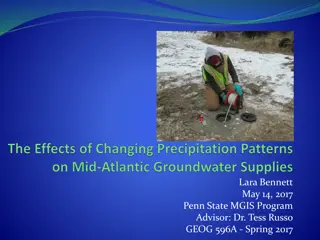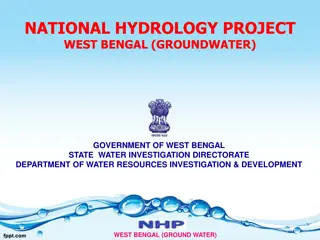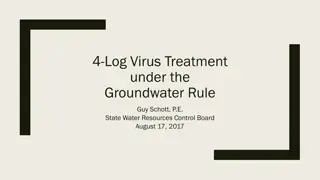Groundwater Quality Assessment & Corrosiveness Evaluation
Explore groundwater quality using WQI & corrosion indices. Study in Bihar, India aids in sustainable management approaches.
0 views • 14 slides
Understanding the Economic and Health Impacts of Groundwater Nitrate Contamination in Nebraska
The economic and health costs of groundwater nitrate contamination in Nebraska highlight the challenges of ensuring safe drinking water. Despite largely safe levels, proactive strategies are essential due to rising nitrate levels and costly maintenance efforts. The compliance record shows progress i
0 views • 18 slides
Sustainable Use of Groundwater
Groundwater management and sustainable use are crucial in India, as highlighted by the Ministry of Jal Shakti. The country faces challenges such as declining groundwater levels, quality deterioration, and increasing demand-supply gaps. Effective strategies and responsible practices are needed to add
0 views • 20 slides
Overview of Guam Regulatory Aquifer Mapping and Groundwater Protection
Guam's Regulatory Aquifer Mapping includes conflicting maps from USEPA, the Northern Guam Lens Study, and Groundwater Protection Zones, impacting land use regulations and water quality standards. Issues arise from inconsistencies in regulatory tools and language errors within the protection zones. Z
2 views • 19 slides
Understanding the Water Cycle and Its Importance in Nature
Water is essential for all life on Earth, continuously moving through different physical states in a cycle that has been occurring for over 4 billion years. The Water Cycle involves processes like evaporation, transpiration, condensation, precipitation, and collection, ensuring water is always movin
11 views • 7 slides
Groundwater Recharge Station Project
The Groundwater Recharge Station Project, Project Number 21-381, at California State University, Stanislaus involves the construction of a groundwater recharge station. The notice to contractors provides details on bid proposals, project scope, budget estimate, project duration, and prequalification
0 views • 19 slides
Microplastic Occurrence in South Korean Groundwater by Well Depth and Hydrogeology
The study conducted by Kangwon National University in South Korea analyzed microplastic occurrence in groundwater from wells of varying depths and hydrogeological settings. Samples were collected from the National Groundwater Monitoring Network pipes in Gapyeong and Chuncheon. Water type analysis re
7 views • 6 slides
Understanding the Water Bearing and Yielding Properties of Rocks
This informative content delves into the significance of porosity and permeability in rock formations, detailing primary and secondary porosity types, factors influencing porosity, and the concept of Darcy's Law governing groundwater flow. It emphasizes the relationship between effective porosity, r
1 views • 13 slides
Understanding Groundwater: Occurrence, Recharge, and Movement
Groundwater occurs when water seeps into the subsurface through cracks and pores in rocks and soil, forming the water table. Recharge happens naturally through processes like precipitation and snowmelt, as well as artificially through methods like recharge wells and water spread over land. The movem
0 views • 8 slides
Understanding Groundwater Level Measurement Technologies
Groundwater levels are commonly measured using submersible pressure transducers, with data loggers used for monitoring and recording. Different options such as vented vs. non-vented systems, battery voltage considerations, and specifications for pressure sensors are discussed. Additional equipment l
0 views • 12 slides
Human Health Risk Assessment due to High Concentrated Arsenic in Groundwater
This term paper focuses on assessing human health risks associated with elevated levels of arsenic in drinking groundwater. Various exposure routes and sources of arsenic contamination are investigated, leading to a comprehensive risk assessment. The results indicate non-carcinogenic effects and pot
0 views • 6 slides
Groundwater Suitability Mapping Training Overview
The training program focuses on GIS and Remote Sensing for overlay analysis, with an emphasis on generating groundwater suitability maps. Dr. Maarten Waterloo leads the session, covering topics like data processing, automation, and sensitivity analysis. The program includes hands-on activities and e
0 views • 14 slides
Impact of Road Deicing Salts on Water Quality in Upper Passaic River Basin
An in-depth geochemical analysis conducted by Dr. Michael A. Turner and Dr. Duke U. Ophori studied the impact of road deicing salts on groundwater quality in the Upper Passaic River Basin, New Jersey. The study focused on major ions in groundwater, statistical analysis of ion concentrations, correla
0 views • 19 slides
Impacts and Implications of Climate Change on Groundwater Resources
Climate change has significant effects on groundwater resources, impacting storage, abstraction, and regulation. These impacts lead to challenges in water supply management, with implications on socio-ecological activities such as water stress, drought, and disease outbreaks. Understanding these con
0 views • 44 slides
Surface Water-Groundwater Interactions and Nitrogen Cycling in a Tidally Influenced River Study
Study on the dynamic interactions between surface water and groundwater in a tidal river, focusing on nitrogen cycling. The research highlights the impact of tidal fluctuations on bank storage, nitrogen transformation, and nutrient cycling. Findings suggest that river discharge affects the exchange
1 views • 16 slides
Request for Declaratory Ruling Regarding Groundwater Contamination in North Carolina
Cape Fear River Watch, Sierra Club, Waterkeeper Alliance, and Western North Carolina Alliance have petitioned the EMC for a declaratory ruling concerning the application of groundwater rules to coal ash lagoons. They seek clarification on the 2L Rule's requirements for corrective action and source e
0 views • 7 slides
Sustainable Groundwater Management in Stanislaus County: A Comprehensive Overview
Long-term groundwater replenishment programs, pumping policies, and the Sustainable Groundwater Management Act (SGMA) are crucial for managing water resources in Stanislaus County. The Modesto Irrigation District's (MID) efforts in conjunctive use, groundwater recharge projects, and public outreach
2 views • 10 slides
Reproducible Groundwater Science Workflows: Enhancing Decision Support for Texas
Explore the significance of reproducible science workflows in the context of Texas Groundwater Availability Models. Learn about challenges, solutions, and the importance of creating sustainable environmental decision support systems.
0 views • 14 slides
Proposed Revisions to Groundwater Corrective Action Rule for EMC Review
The document outlines proposed revisions to the Groundwater Corrective Action Rule (15A NCAC 2L.0106) for Environmental Management Commission (EMC) review. Recommendations include clarifying terminology, compliance boundaries, non-permitted activities, and permit types. Two draft rule options are pr
0 views • 9 slides
Understanding the Importance of Soil and Groundwater Measurements
Explore the significance of infiltration and hydraulic conductivity measurements in environmental studies, training sessions offered by Eijkelkamp Training & Consultancy, and various reasons for conducting measurements such as defining drain distance, disconnecting rainwater, soil and groundwater po
0 views • 55 slides
Town of Islip Department of Environmental Control Annual Report 2015
The Islip Resource Recovery Agency and the Department of Environmental Control manage solid waste services for Islip town residents, including recycling, waste-to-energy, composting, and C&D debris facilities. They also emphasize recycling education and operate the Islip Animal Shelter. The Blydenbu
0 views • 13 slides
San Benito County Water District Groundwater Sustainability Agency Technical Advisory Committee Meeting Summary
The San Benito County Water District Groundwater Sustainability Agency Technical Advisory Committee met on August 26, 2020, to discuss various topics including update on GSP schedule, setting sustainability criteria, and monitoring for subsidence issues. The meeting highlighted the need for more sys
0 views • 33 slides
Virtual Groundwater Research Lab Solutions
CeRDI from the Centre for eResearch and Digital Innovation focuses on creating virtual groundwater research laboratories using interoperable technologies. They address challenges such as providing access to complex data, incorporating qualitative and quantitative data into models accurately, harness
0 views • 21 slides
Sustainable Groundwater Management Grant Applications Update
An update on the Round 2 Sustainable Groundwater Management Grants, including details on the grant application process, funding availability, application submissions, and project components. The applications are part of efforts to support sustainable groundwater management in the Turlock Subbasin an
0 views • 6 slides
Iron and Manganese Removal from Groundwater Study
Iron and manganese are common natural elements in groundwater, but their presence can lead to various issues such as metallic taste, staining of clothes and fixtures, and growth of iron bacteria. This study aims to analyze groundwater wells in Libya, identify high levels of iron and manganese, and p
0 views • 29 slides
Enhancing Flow Opportunities in Scott Valley Groundwater Study
The Scott Valley Groundwater Study identifies flow enhancement opportunities to improve water management and increase stream flows. Initiatives include developing an integrated hydrologic model, exploring water management strategies, and implementing groundwater recharge projects since 2008. The stu
0 views • 6 slides
Long-Term Management of Contaminated Soil and Groundwater in Iwilei District, Honolulu
The Iwilei District in Honolulu, Hawaii, spans 315 acres with multiple landowners and responsible parties. It features commercial and industrial use, including bulk fuel terminals, former MGP site, active/inactive petroleum pipelines, and Dole Cannery. The area has been impacted by petroleum-contami
0 views • 25 slides
Human Impacts on Groundwater Systems in Minnesota: A Study of Interactions and Solutions
Explore the intricate relationships between human activities and groundwater systems in Minnesota through investigations, models, and technological solutions. Utilize place-based evidence, including insights from Minnesota American Indian tribes and cultures, to understand and address climate change
0 views • 7 slides
Groundwater Sustainability Outreach Update
The update includes details on GSA outreach efforts, project schedules, open house events, and workgroup meetings. Materials, mailers, bilingual flyers, and press releases were distributed to NGOs, businesses, and water suppliers. Social media and local GSA communication strategies were also employe
0 views • 26 slides
Redox Conditions and pH Control in a Mountain Watershed: Study in Red Canyon, Wyoming, USA
Exploring redox conditions and trace element concentrations in a semi-arid mountain watershed, this study in Red Canyon, Wyoming, delves into the impact of oxic surface water and anoxic groundwater on trace element cycling. The investigation aims to enhance understanding of seasonal variabilities, f
0 views • 11 slides
Trends in Nitrate Concentrations in Suffolk County Public Water-Supply Wells 1982-2008
This study analyzes trends in nitrate concentrations in public water-supply wells in Suffolk County, New York, from 1982 to 2008. Groundwater is a crucial source of drinking water, with potential impacts on coastal waters. The analysis reveals increasing nitrate trends over both long and short terms
0 views • 17 slides
Understanding Groundwater Hydraulics and Hydrology
Explore the fundamentals of groundwater hydraulics and hydrology in this course, covering topics such as Darcy's law, aquifer testing, unsaturated flow, and more. Dive into practical applications and participate in a team project focusing on limiting hydraulic containment of contaminated aquifers. G
0 views • 25 slides
Understanding Darcy Law and Methods for Aquifer Property Evaluation
Darcy Law, introduced by Henry Darcy, defines the relationship between flow rate, head loss, cross-sectional area, and flow path length in porous media like aquifers. By conducting experiments and measuring hydraulic conductivity, Darcy Law allows estimation of groundwater velocity and flow characte
0 views • 49 slides
Enhanced Groundwater Recharge Technologies Overview
This presentation on Enhanced Groundwater Recharge Technologies covers a range of topics including background information, local assessments, groundwater recharge zones, and opportunities in Stanislaus County. It delves into various methods such as drywells, spreading basins, and aquifer storage, as
0 views • 9 slides
Enhancing Groundwater Governance and Cooperation in Phase 2 of GGRETA Project
The proposed Phase 2 of the GGRETA Project aims to improve groundwater governance, develop gender-responsive water approaches, and enhance cooperation on water security in countries like El Salvador, Honduras, South Africa, and others. The objectives include improving resource knowledge, fostering c
0 views • 5 slides
Understanding Groundwater Hydrology Concepts at Brigham Young University
Explore the derivation of transient terms, specific storage mechanisms, and distinctions between specific storage, storativity, and specific yield in groundwater hydrology. Delve into the mathematical equations governing groundwater flow and storage, understanding the change in mass stored in the sy
0 views • 17 slides
Understanding Groundwater Sustainability and Equilibrium Dynamics
This content delves into the concepts of groundwater sustainability, equilibrium, and capture in relation to groundwater management. It explores transitional storage, groundwater mining, and debunks the water budget myth. The images and explanations illustrate how pumping affects aquifers, the evolu
0 views • 11 slides
Exploring the Critical Relationship Between Climate and Groundwater
Investigating groundwater as a vital global resource, this study delves into the profound impact of climate change on groundwater levels and quality. Highlighting challenges and solutions, it emphasizes the urgent need for sustainable groundwater management practices.
0 views • 21 slides
National Hydrology Project in West Bengal - Groundwater Management Overview
This document details the National Hydrology Project in West Bengal, focusing on groundwater management initiatives by the Government of West Bengal. It includes information about the project structure, management units, fund received and expenditure, as well as the cost components. Key personnel an
0 views • 27 slides
Understanding 4-Log Virus Treatment and Groundwater Rule Compliance
This collection of images and information delves into the importance of 4-log virus treatment under the Groundwater Rule, regulatory requirements for groundwater systems, the basics of Ct calculations for disinfection, types of disinfectants used, and understanding log inactivation of viruses. The c
0 views • 24 slides
